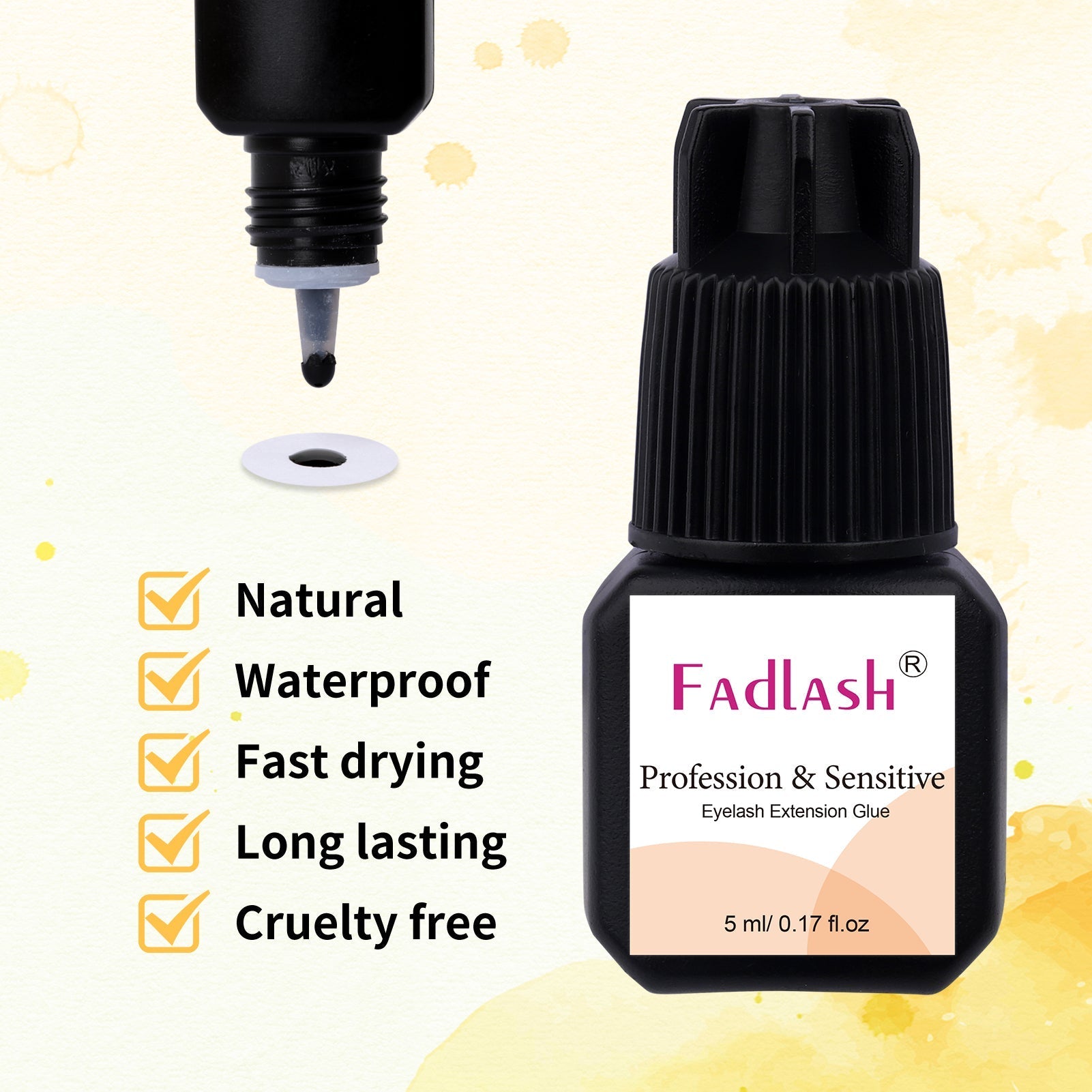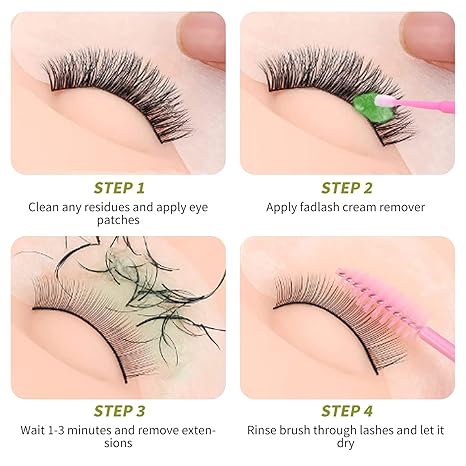The Ultimate Guide to Eyelash Extensions and Allergies
Eyelash Extension Allergy vs Irritation
Just got eyelash extensions, but instead of looking more beautiful, your eyes are itchy, red, swollen, and burning?
You're probably frantically searching for "eyelash extensions and allergies" worried about disfigurement but also reluctant to give up your hard-earned lashes.
Take a deep breath first. ❤️
This article is for you—whether you're experiencing an allergic reaction, wondering if you're "not suited to it," or an eyelash technician looking to learn how to handle "allergies vs. irritations," this will give you the ultimate guide to understand.
Table Of Contents:
Eyelash Extension Allergy vs Irritation
Many people have the same question when they first experience discomfort:
"Is this an allergic reaction, or just an irritation? Should I remove it immediately? Should I see a doctor?"
The distinction between these two situations is crucial because the treatments are completely different:
Irritation: This is more like a "chemical irritation" or "fume inhalation," mostly related to glue fumes, handling posture, or eyes not being fully closed.
Allergy: This is the immune system's reaction to a certain ingredient. Once an allergy is established, each future exposure to that ingredient may trigger a relapse, often more severe than the last.
Let's break down the symptoms of both.
Eyelash Extension Allergy Symptoms
Characteristics of eyelash extension allergies:
- Symptoms typically appear gradually over several hours to 24–48 hours, rather than erupting immediately.
- They are primarily concentrated on the skin of the eyelids and the base of the eyelashes, rather than the eyeball itself.
Typical symptoms include:
- Noticeable redness, swelling, and tightness of the eyelids
- Intense itching, with a constant urge to scratch
- Dry, peeling skin, sometimes with small blisters
- Sometimes accompanied by increased tearing and photophobia
Severe swollen allergy to eyelash extension can even cause the eyes to swell so much that they cannot be opened, requiring immediate medical attention.
Irritation, not Allergy
Irritation is more like being "smelled" or experiencing a "mild chemical burn," characterized by:
- Symptoms appearing during or immediately after the grafting process
- Primarily affecting the eyeball and conjunctiva
- Redness of the whites of the eyes (visible bloodshot eyes)
- Increased tearing
- Mild stinging or burning sensation
- It usually subsides gradually within a few hours to 24–48 hours and does not worsen over time.
Common causes of irritation include: glue fumes, eyes not being fully closed during the procedure, excessive glue application, and improper wind direction.
Allergy vs. Irritation: Quick Self-Checklist
| Comparison Items | Allergy | Irritation |
| Time of Occurrence | The condition usually worsens gradually within a few hours to 24/48 hours after grafting. | It occurs during or immediately after grafting. |
| Location of discomfort | Mainly the skin around the eyelids and eyelash roots | Mainly the eyeball and conjunctiva |
| Main symptoms | Significant redness and swelling, intense itching, peeling, possible blisters | Red eyes, tearing, mild stinging or burning sensation |
| Trend of Change | It will not improve on its own and often gets worse the longer it is left untreated. | It usually eases within 24–48 hours. |
| Essential Mechanism | Allergic reaction of the immune system | Transient chemical or mechanical stimulation |
If you find yourself more likely to fall into the "allergy" category, please don't try to tough it out any longer and contact your eyelash technician/doctor as soon as possible.
Why did I suddenly have an allergic reaction?
Can You Develop an Allergy to Eyelash Extensions Over Time?
Many people say:
"I've had eyelash extensions for years without any problems, why am I suddenly having an allergic reaction this time?"
This is actually a typical case of the "allergy threshold":
Allergies often don't occur on the first exposure, but rather the body gradually "remembers" the same allergen through repeated exposure.
When the body's "allergy threshold" is exceeded, the immune system suddenly "outbursts" after a particular extension, manifesting as allergic reactions such as redness, swelling, itching, and rashes.
Therefore, even if you've had perfect results with all your previous extensions, it's still possible to suddenly experience the true nature of the situation described in the question, "Can you develop an allergy to eyelash extensions?"—the answer is: Yes, and the risk will be higher if you get them done again in the future.
Why do allergies occur? Unveiling the real allergens.
Many people's first reaction is:
"Am I allergic to the material of my false eyelashes?"
In fact, most allergies related to eyelash extensions are "eyelash extension adhesive allergy," meaning a reaction to the adhesive components, not to the eyelash fibers themselves.
The real culprit: Allergic reaction to eyelash extension glue
The core ingredient in professional eyelash extension glue is:
Cyanoacrylate
This is the key ingredient that allows false eyelashes to adhere firmly to real eyelashes, and it's also the main allergen in most eyelash extension glue allergies.
Regarding glue allergies, here are a few points to note:
Even "sensitive skin" or "low-irritant" glues almost always contain cyanoacrylate, just with different formulations and concentrations.
Some low-quality glues may also contain formaldehyde or other impurities, which are more likely to irritate or trigger allergies.
Some people may also react to pigments in glue (such as carbon black). If you suspect allergies, try transparent glue as an alternative.
Therefore, once it is confirmed to be typical eyelash extension adhesive allergy, it usually means that it is best not to get eyelash extensions again in the future (even if you switch brands, there is still a high risk of recurrence).
How to Treat Eyelash Extension Allergy
If you are experiencing significant eyelid redness, swelling, itching, peeling, or even blisters—this is a classic sign of eyelash extension allergy and requires immediate action.
Please follow the steps below (not all of this can be done by yourself!):
Step 1: Don't pull them out yourself! Contact your eyelash technician first.
Many people's first reaction to allergies is:
"It's so uncomfortable, I might as well just pull the false eyelashes off!"
This is strongly discouraged.
Pulling them out will tear off your real eyelashes along with them, potentially causing bald patches and damage to hair follicles.
If your skin and mucous membranes are already inflamed, further pulling will worsen the irritation and inflammation.
The correct approach is:
Contact your eyelash technician as soon as possible, explaining your symptoms: redness, swelling, itching, duration, etc.
Inquire whether a professional removal cream can be arranged to remove the eyelashes and glue residue safely using a specialized remover.
⚠️ Note: If your symptoms are severe enough to make it difficult to open your eyes or affect your vision, please seek medical attention first. Removal should only be performed after evaluation by a doctor.
Prevention is Key: Choosing Hypoallergenic Products is Crucial
Many allergic reactions stem from **cyanoacrylate** in eyelash glue, despite it being central to the longevity of eyelash extensions. For clients with a history of allergies or known skin sensitivity, choosing hypoallergenic products is the first step to ensure safety when attempting extensions again.
Consider using Fadlash Professional Hypoallergenic eyelash extension glue. This glue is specially formulated for sensitive eyes, significantly reducing irritation and volatile odors. While the longevity of hypoallergenic glue may be slightly less than professional quick-drying glue, it significantly reduces the risk of contact dermatitis or chemical reactions. Before your extensions, consult with your lash technician and request a gentle formula, and perform a small skin test before first use.
Frequently Asked Questions about Allergic Reactions to Eyelash Extensions
Q1: How Long Does Eyelash Extension Allergy Last?
If it's a mild reaction, after removing the allergen (removing the eyelashes and cleaning up any glue residue) and with treatment under a doctor's guidance, it usually subsides gradually within a few days to 1–2 weeks.
Q2: Will an allergic reaction to eyelash extensions disappear on its own?
A true allergy won't disappear just because you "get used to it after a few times." On the contrary:
Each subsequent exposure can potentially make the reaction faster and more severe.
In some people, a localized skin reaction can even develop into systemic allergic symptoms.




